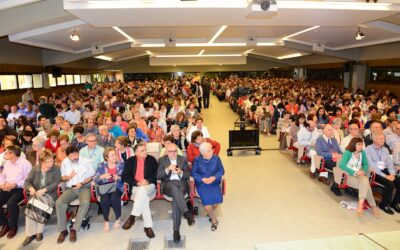On July 12, 2012, the 66th Session of the United Nations General Assembly proclaimed March 20th as International Happiness Day. UNRIC Italy has decided to bring this to the public’s attention with the help of Professor Luigino Bruni, Professor of Political Economy at the LUMSA University of Rome, and global coordinator of the Economy of Communion project which was launched by Chiara Lubich in Brazil (1991). The project currently includes over 1000 businesses worldwide. The Economy of Communion proposes that entrepreneurs share business profits with development projects in different parts of the world, which is based on a model of reciprocity and gift.  Prof. Bruni, you were one of the first to re-launch an Italian rendition of happiness that is different from the one that comes from the United States. Can you explain more about what lies beneath this vision of happiness? “The most distant origins of the notion of happiness are found in the ancient Greek and Roman culture, especially in Aristotle who had linked happiness to the virtues and had distinguished it from pleasure. It was a concept which today we would have to translate as “human blossoming” because it goes back to the idea that happiness is a general state of existence. The Greeks had understood that only the virtuous man could become happy by cultivating the virtues, even in the face of bad luck. This is where our responsibility begins, because it is possible to say that the main protagonist of my happiness (and unhappiness) is me, and not the external events which certainly are a burden on my wellbeing, but never decisive in determining my happiness.” Where does the idea of happiness in economic science come from? “Italian economists and philosophers from the 1700s placed happiness at the centre of their reflections on economy and civil life. They were thinking in Roman and Medieval terms of public happiness and then the common good. Throughout the 1800s the Italian school of economy was known for its focus on happiness as the main object of its study. Therefore, it is not surprising that Italian economists today are among the protagonists of the new movement on Economy and Happiness, which was re-launched in the 1970s. It mostly focused on the link between happiness and social relations, an obvious reference to the ancient tradition of felicitas publica.” Which aspects would you say are most relevant for civil and economic life today?
Prof. Bruni, you were one of the first to re-launch an Italian rendition of happiness that is different from the one that comes from the United States. Can you explain more about what lies beneath this vision of happiness? “The most distant origins of the notion of happiness are found in the ancient Greek and Roman culture, especially in Aristotle who had linked happiness to the virtues and had distinguished it from pleasure. It was a concept which today we would have to translate as “human blossoming” because it goes back to the idea that happiness is a general state of existence. The Greeks had understood that only the virtuous man could become happy by cultivating the virtues, even in the face of bad luck. This is where our responsibility begins, because it is possible to say that the main protagonist of my happiness (and unhappiness) is me, and not the external events which certainly are a burden on my wellbeing, but never decisive in determining my happiness.” Where does the idea of happiness in economic science come from? “Italian economists and philosophers from the 1700s placed happiness at the centre of their reflections on economy and civil life. They were thinking in Roman and Medieval terms of public happiness and then the common good. Throughout the 1800s the Italian school of economy was known for its focus on happiness as the main object of its study. Therefore, it is not surprising that Italian economists today are among the protagonists of the new movement on Economy and Happiness, which was re-launched in the 1970s. It mostly focused on the link between happiness and social relations, an obvious reference to the ancient tradition of felicitas publica.” Which aspects would you say are most relevant for civil and economic life today?  “The first element that seems of particular relevance to the state of the economy and the society today is the profound relationship between happiness and virtue. In a culture that underscores hedonistic pleasure and recreation as the values matched with happiness, the ancient Italian tradition of the felicitas publica invites us to keep in mind that no good individual nor social life exist without the cultivation of excellence and therefore the commitment to sacrifice. Secondly, in a phase of the West in which narcissism is becoming an actual pandemic, the tradition of public happiness reminds us of the unavoidable link between the good life and social relations. You can never be truly happy alone, because happiness at its roots is something relational.” Source: www.unric.org
“The first element that seems of particular relevance to the state of the economy and the society today is the profound relationship between happiness and virtue. In a culture that underscores hedonistic pleasure and recreation as the values matched with happiness, the ancient Italian tradition of the felicitas publica invites us to keep in mind that no good individual nor social life exist without the cultivation of excellence and therefore the commitment to sacrifice. Secondly, in a phase of the West in which narcissism is becoming an actual pandemic, the tradition of public happiness reminds us of the unavoidable link between the good life and social relations. You can never be truly happy alone, because happiness at its roots is something relational.” Source: www.unric.org
Get to know each other
Get to know each other




0 Comments